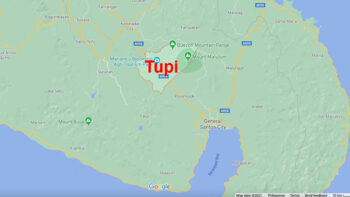MALAYBALAY CITY (MindaNews/22 July) – The main task at the moment of the National Commission on Indigenous Peoples (NCIP) is to make President Benigno Aquino III better understand the needs of the indigenous peoples, according to NCIP chair Zenaida Brigida Hamada-Pawid.
Pawid said Friday the NCIP needs a serious lift in the budget department to be able to perform. She said the NCIP, with 1,600 personnel, has barely half a billion pesos for 2011.
“This is nothing compared to the budget of the environment department,” she added.
The new NCIP chair, who is from the Cordillera, was in town for the launch of the Department of Education’s Philippines’ Response to Indigenous Peoples’ and Muslim Education (PRIME) program. PRIME will be initially funded by the Australian Aid for International Development (AUSAID) for three years.
She said a big problem with the budget and some ancestral domain claimants being caught in the crossfire of armed conflicts have slowed down the NCIP’s distribution of Certificate of Ancestral Domain Title (CADT). She said the NCIP could not cope with the previous target to distribute a CADT per province per year.
Francisco Mabaso Jr., of the People Power Volunteers for Reform in Bukidnon, pointed out the same problem of the NCIP in an earlier interview.
“However, we need to clean the NCIP as an institution because as alleged by our IP leaders, there is corruption in the agency. I believe, one CADT a year processing is too slow. We can have more,” he added in an email response to a query by MindaNews.
Mabaso’s group is part of civil society organizations who vowed to help monitor the implementation of national government programs.
“The general feeling is that the problem (alleged irregularities in the NCIP) is nationwide,” he added.
Pawid vowed to look at the issue.
She was quoted in the Office of the Presidential Assistant on the Peace Process (OPAPP) website that among the first things the NCIP will pursue is make a legal audit of the cases filed against them in relation to the Indigenous Peoples Rights Act (IPRA), as well as address the issues on CADT.
“Over and above everything else, we’ll seriously look at the CADT as the beginning of resource ownership management. That, perhaps, is the biggest problem of the NCIP,” she added.
Pawid was quoted as saying there are IPs who hold CADTs and CALTs (Certificate of Ancestral Land Titles) but other people have been benefitting from it.
Pawid said in the June 8 press release of the OPAPP that they will set up a “truly credible and responsible database for IPs with the interpretation and analysis of all the data.”
“We will also build a human resource pool in the NCIP,” she added.
On the problem of indigenous peoples being caught in the crossfire, Pawid vowed that an NCIP team will help manage conflict that has erupted in IP areas, which have been frequent battlefields between government soldiers and New People’s Army (NPA) rebels.
She could not say what’s on the plate for the indigenous peoples in President Aquino’s State of the Nation Address on July 25.
In his SONA last year, the President was silent on his program for the indigenous peoples, Lumad leaders said.
“Where is his policy for the assertion of the rights of indigenous peoples? None!” said a number of participants of the State of the Indigenous Peoples Address (SIPA) held at the Talaandig Tribal Hall on July 27, 2010, where a hundred tribal leaders from all over the country joined the SIPA, intentionally scheduled in time for the SONA.
“With Aquino stating nothing on his programs for the IP, we have nothing to account him for,” lamented Higaonon Datu Tony Lumandog of Misamis Oriental. The only time President Aquino talked of the Lumads was when he committed to include them in the Mindanao peace process.
Datu Hawadon Cesar Batao, provincial tribal chieftain of Surigao del Sur, said the President did not mention if the Lumads are part of his priorities.
“We feel he promotes investors more, who are a big disgrace for us. They exploit our natural resources in our ancestral domain,” Batao said last year.
Pawid said the conflict between the interest of the indigenous peoples and the mining industry is one of the President’s hurdles. (Walter I. Balane / MindaNews)
